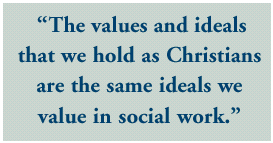|
Christie Steele and
Tashekia Brown gained hands-on experience through internships at
Pathways in Jackson. |
| The dictionary definition of compassion is "the deep
awareness of the suffering of another coupled with the wish to relieve
it.” Compassion is much more – it is a cornerstone value and serves
as the guiding force for social work professionals.
Union University’s social work program integrates Christian teachings and values into an academically challenging program of study. Jesus serves as the ultimate model for compassionate advocacy for the disadvantaged. Developing culturally competent professionals is the goal of Union’s social work program. Being culturally competent means being able to relate to those different in some way and see the world from their perspective. Social work began as a ministry of the church in the early 19th century. Church members felt the faith-based call to provide for, help and serve the less fortunate in society. “Social work is a profession that goes hand-in-hand with Christianity,” says David Pearce, a social work major at Union. “The values and ideals that we hold as Christians are the same ideals we value in social work.” For Mary Anne Poe, director of social work and assistant professor at Union, the calling was clear after four years of inner-city ministry work with the poor, mentally-ill and abused. It was that experience that affirmed Poe’s call to ministry. She went on to receive her master of divinity in social work from Southern Seminary and a master in social work from the University of Louisville. “It’s not enough to just want to help,” says Poe. “You have to know the resources and understand that person’s point of view.” The social work program provides students with the resources and knowledge to provide help. The program involves classroom lectures and clinical experience in a variety of environments. The students are challenged to step outside of their comfort zone early in the program, according to Poe.
“When I first entered the class “Introduction to Social Work,” there were approximately 25 students and I was one of only two guys in the class,” said Pearce. “At first this was a little awkward and intimidating. I under-stood what it felt like to be a minority. However, this experience will help me relate to a wider range of clientele in my career field. I will have more com-passion and sensitivity to others who find themselves in unfamiliar settings.” Learning is not confined to the classroom though. Students are formally accepted to the program during the spring of their sophomore year. Following acceptance, students are required to perform at least 12 hours each semester of volunteer work in community agencies. Sophomores also take the Community Social Experience course that places students in community agencies. “Students usually decide early on if social work is right for them as a result of the volunteer work,” says Poe. “Most majors have a very clear sense of calling to ministry.” The capstone course of the pro-gram is a field practicum of over 400 hours of work in an agency under a social worker. The experience allows students to apply everything learned in previous classes and prepares them to successfully compete in the job market. In fact, several Union graduates have been hired as a direct result of the practicum experience. This fall students are volunteering at agencies including Jackson Madison County General Hospital, Pathways, Youth Villages, Carl Perkins Center, Birth Choice, W.R.A.P., Area Relief Ministries, Headstart and Big Brothers/Big Sisters. “I am very impressed with the students in the program,” says Pat Taylor, a licensed clinical social worker for Pathways in Jackson, Tenn. “The students are fully prepared, enthusiastic, and place an emphasis on Christian values.” Taylor has worked with Pathways for over 20 years. She also serves on Union’s social work advisory committee and is an adjunct faculty member. As a field supervisor for the program, Taylor says she continues to be impressed with the high caliber training and preparation Union students receive. Opportunities abound outside the classroom for social work majors to use their talents. The Student Association of Social Workers (SASW) is one avenue for involvement. SASW has been very active for the last two years. Last Christmas the organization sponsored a Christmas breakfast with Santa for 50 at-risk children in the community. For Social Work Awareness Day in March SASW invites community agencies to set up informational booths on campus. A silent auction is also held to raise money for community projects and scholarships. Having a clear understanding of what graduates will face in the real world is important to the faculty in the program. The Advisory Council of Community People was created to help develop the curriculum. The council is com-posed of social work practitioners, alumni and students. Many of the advisors also serve as supervisors for the field practicums. This provides a strong tie between the classroom and field experiences. The faculty and administration continue to enhance the educational value of the social work program. In 1998, the social work program received candidacy status for national accredita-tion by the Council on Social Work Education (CSWE). Poe is hopeful that accreditation will be finalized by summer 2001. “Accreditation legitimizes the education Union students receive,” says Poe. “Graduates from accredited pro-grams are more prepared for certification and licensure upon graduation.” Social work majors at Union learn to see their career through the lens of Christian values. “It’s exciting to help students see a ministry,” says Poe. Preparing students to make a difference in the lives of others is the ultimate goal. |


 Even the
most ordinary events contribute to developing understanding and
compassion. Pearce described one such event in the December 1999 issue
of The Social Networker, Union’s social work program
newsletter.
Even the
most ordinary events contribute to developing understanding and
compassion. Pearce described one such event in the December 1999 issue
of The Social Networker, Union’s social work program
newsletter.